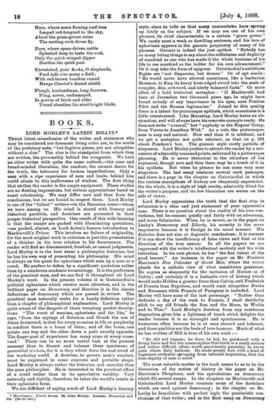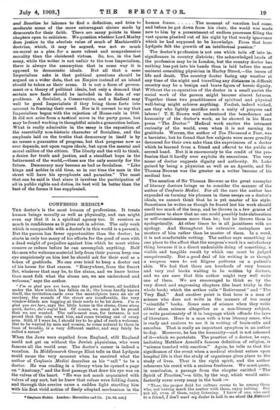BOOKS.
LORD MORLEY'S LATEST ESSAYS.*
THESE latest miscellanies of the writer and statesman who may be considered our foremost living critic are, in the words of the prefatory note, "but fugitive pieces, yet not altogether without a clue." The clue is the standpoint from which they are written, the personality behind the cotainents. We have no other writer with quite the same outlook,—the sane and broad-minded liberalism, the candour, the earnest desire for the truth, the tolerance for human imperfections. Only a man with a ripe experience of men and books behind him could attain to this mellowness of wisdom. The first thing that strikes the reader is the ample equipment. These studies are no fleeting impressions, but serious appreciations based on exact scholarship. We may differ now and then from the conclusions, but we are bound to respect them. Lord Morley is one of the "fullest" writers—in the Baconian sense—whom we have among us. His mind is stored with literary and historical parallels, and doctrines are presented in their proper historical perspective. One result of this wide learning is that the essays are packed with illuminating quotations, —as packed, almost, as Lord Acton's famous introduction to Machiavelli's Prince. This involves no failure of originality, for the most original work in criticism is just this presentation of a thinker in his true relation to his forerunners. The reader will find no disconnected, freakish, or casual judgments. Lord Morley is in the best sense a philosophic historian, but he has his own way of presenting his philosophy. His mind is always on the quest for aphorisms which sum up a man or a creed. He prefers to define by a significant quotation rather than by a cumbrous academic terminology. It is the preference of the practical man, and we can find it throughout all Lord Morley's work. In the present volume it is G-uicciardini's political aphorisms which receive most attention, and in the brilliant paper on Democracy and Reaction it is the classic definitions of democracy which are passed in review. The practical man naturally seeks for a bandy definition rather than a chapter of philosophical explanation. Lord Morley is quite aware of the dangers of these tempting pocket descrip- tions. "The worst of maxims, aphorisms and the like," he says, "from the sayings of Solomon and Sirach the son of Jesus downward, is that for every occasion in life or perplexity in conduct there is a brace of them ; and of the brace, one points one way and the other down a path exactly opposite. The finger-post of experience has many arms at every cross- road." There can be no more useful task at the present moment than to dissect and balance these specimens of proverbial wisdom, for it is they which form the real creed of the workaday world. A doctrine, to govern men's conduct, must be expressed in some concrete and portable shape. Lord Morley is always rather the historian and moralist than the pure philosopher. He is interested in the practical effect of a creed rather than in its speculative validity. Very naturally and rightly, therefore, he takes the world's creeds in their aphoristic form.
We are diffident of saying much of Lord Morley's literary
* Miscellanies Fourth Serie% By John Morley. London: Macmillan and Co. [78. 6d. net.]
style, since he tells us that many corcombries have sprung - up lately on the subject. If we may use one of his own phrases, its chief characteristic is a certain "grave power."
We rarely meet a weak or dawdling sentence, and his love of aphorisms appears in the gnomic pregnancy of many of his phrases. Gnomic is indeed the just epithet. "Nobody has so many biting things to say about the selfishness and duplicity of mankind as one who has made it the whole business of his life to use mankind as the ladder for his own advancement."
Or it may take the form of epigram. Guicciardini's ambitious flights are "not diapasons, but drones." Or of apt simile : "He would never have allowed conscience, like a barbarian Brennus, to fling its heavy keen-edged sword into the scale of complex, dim, awkward, and nicely balanced facts." Or more often of a bold historical metaphor : "If Machiavelli had been at Jerusalem two thousand years ago, he might have found nobody of any importance in his eyes, save Pontius Pilot and the Roman legionaries." Joined to this quality there is a talent for picturesque epithets, which sometimes is a little overstrained. Like Macaulay, Lord Morley hates an ab-- etraction, and will always have his concrete example ready. He does not write "a rascal," but "anybody in the Rogues' Camp, from Verres to Jonathan Wild." As a rule, the picturesque- ness is easy and natural. Now and then it is artificial, and we get a metaphor not quite relevant, as that on p. 291 about Pandora's box. The gnomic style rarely permits of eloquence. Lord Morley prefers to attract the reader by a suc-
cession of admirably reasoned points, enlivened by a picturesque. phrasing. He is never rhetorical in the structure of his
argument, though now and then there may be a touch of it in his epithets. But when he pleases he can come very near eloquence. The last essay contains several such passages, and there is a page in the chapter on Guicciardini in which the various conceptions of history are eloquently expounded. On the whole, it is a style of high merits, admirably fitted for the writer's purpose, and its few blemishes are errors on the side of virtue.
Lord Morley appreciates the truth that the first step in refutation is a clear and just statement of your opponent's case. There is no question about the reality of his own con- victions, but he reasons quietly and fairly with an adversary, and never fulminates. When he is severe, as in the paper on Lecky's Democracy and Liberty, his severity is the more impressive because it is foreign to his usual manner. His dialectic does not aim at dogmatic conclusions; it is content if it can show the insufficiency of false views and hint at the direction of the true answer. In all the papers we are impressed with the writer's intellectual modesty and his wide toleration. In his own phrase, he has "the fine talent of the good learner." An instance is the paper on Mr. Frederic Harrison's New Calendar of Great Men, where the writer pleads for a catholic view of what constitutes greatness.
He argues as eloquently for the inclusion of Horace as of Calvin ; and certainly it is a fantastic view of history which would make Hobbes a greater force than Calvin, and Frederick of Prussia than Napoleon, and would omit altogether Burke and Rousseau while Francia of Paraguay is included. Lord Morley will have none of the last personage. "Rather than dedicate a day of the week to Francia, I shall decidedly stick to my old friends the Sun and the Moon, to Wodin and to Thor." Lord Morley's freedom from any cumbrous dogmatism gives him a lightness of touch which delights the reader because it is so unsought and spontaneous. He is humorous often because he is at once shrewd and tolerant, and these qualities are the basis of true humour. Much of what he has written of Mill is true of his own work :—
"He did not impose; he drew, he led, he quickened with a living force and fire the commonplace that truth is a really serious and rather difficult affair, worth persistently pursuing in every path where duty beckons. He made people feel, with a kind of eagerness evidently springing from internal inspiration, that the true dignity of man is mind."
The most valuable matter in the book seems to us to be the discussion of the notion of history in the paper on Mr.
Harrison's ThRophano, and the speculations on democracy which fill several essays. In the chapters on Machiavelli and Guicciardini Lord Morley combats some of the doctrines which are used against democracy ; in the chapter on Mr. Lecky he demolishes with perfect logic the pessimistic con- clusions of that writer; and in the final essay on Democracy
and Reaction he labours to find a definition, and tries to moderate some of the more extravagant claims made by democrats for their faith. There are many points in these chapters open to criticism. We question whether Lord Morley does justice to the absolute value of much of Machiavelli's doctrine, which, it may be argued, was not so mach un-moral as a plea for a more robust and comprehensive morality than the cloistered virtues. So, too, in the last essay, while the writer is not unfair to the true Imperialism, there is always the assumption that in some way it is opposed to democratic ideals. Bat all that a sane Imperialism asks is that political questions should be argued on a wider data, that an Empire instead of an island should be taken as their arena. It is net a form of govern- ment or a theory of political ideals, but only a demand that xertsin new facts should be included in the data of our problems. A Socialist, a Conservative, and a Radical may well be good Imperialists if they bring these facts into
account in framing their creed. or is it correct to say that Imperialism began with the rejection of Home-rile in 1886. It did not arise from a tactical move in the party game, but may be found working in thoughtful minds a generation before. What is really admirable in the essay is the exposition of the essentially non-historic character of Socialism, and the emphasis laid on the truths that democracy in itself is by no means a guarantee of progress, but that progress now as ever depends, not upon vague ideals, but upon. the mental and moral calibre of the citizen. The liberty and the will to think, a desire for truth and justice, and a steadfast hope in the betterment of the world,—these are the only security for the future. Democracy may become as bad as feudalism. "Like kings and nobles in old time, so in our time the man in the street will have his sycophants and parasites." The most that can be said is that since it involves the participation of all in public rights and duties, its beat will be better than the best of the forms it has supplanted.



















































 Previous page
Previous page